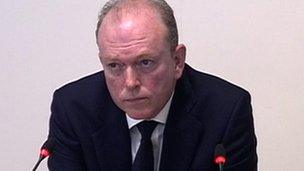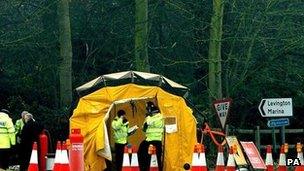Leveson told NoW 'jeopardised' Ipswich murders probe
- Published
A retired police officer has told the Leveson Inquiry into media ethics that the News of World "jeopardised" the Ipswich serial murder probe in 2006.
David Harrison, who carried out surveillance of a suspect for Suffolk Police, said the newspaper hired, externalex-special forces soldiers.
He said they carried out their own surveillance and that could have resulted in police losing track of him.
The inquiry is currently examining the press's relationship with the police.
Mr Harrison, a retired Serious and Organised Crime Agency (Soca) investigator, said he was deployed to help Suffolk police keep a suspect - who was later cleared of involvement - under surveillance in December 2006.
But he said the News of the World (NoW) employed their own investigators to follow the police team.
He added that the Sunday Mirror also picked up the suspect and tried to lose their police trail.
'Out of control'
Lord Leveson said: "In a free society journalists are entitled to go where they want. But how difficult does it make it for the inquiry if a journalist takes a suspect off to interview?"
Mr Harrison said if the suspect had been the real killer, and the press had enabled him to lose his police surveillance team, the investigation could have been hampered if he had disposed of evidence or committed further offences while "out of control".

Mr Twomey said it may be time for the Crime Reporters Association to draw up a code of conduct
"If our surveillance had been weakened by having to try and avoid other surveillance teams looking for us, if we had lost the subject, he may have gone and committed further murders because we were dealing with something else," he added.
Steve Wright, 53, was jailed for life in 2008, for the murders of five women who worked as prostitutes.
John Twomey, chairman of the Crime Reporters Association (CRA), said it was "shocking" the NoW followed a police surveillance team and it would have taken most reporters by surprise.
He also denied there was any "inducement" involved in taking out police officers for lunch in expensive restaurants.
Lord Leveson said he was not being "puritanical" but he asked if there was not a "perception" that such lunches could be perceived as an "inducement".
Mr Twomey, the Daily Express's crime reporter since 1987, said police stations were usually grim places and, like most people, detectives preferred to go to more convivial places like pubs or restaurants.
He said more expensive restaurants tended to be less public, less crowded, with less chance of being overheard.
Mr Twomey said taking contacts out for lunch was common among business, political and defence correspondents and he added: "It doesn't mean you're knocking back £400 bottles of champagne."
'Bread and butter'
He was also asked about gifts the CRA gave to senior police officers Lord Condon, Lord Stevens and Peter Clarke, on their retirement from the Met.
Mr Twomey said Mr Clarke in particular was recognised for his work in the fight against terrorism and the gift was a "small token of our regard".
He said it may be time for the CRA, which has 47 members, to draw up a code of conduct, but warned that it would need careful thought because "we want it to be enduring".

The Ipswich murders provoked feverish press interest
He also told the inquiry some police contacts had stopped talking to the press after the negative publicity Scotland Yard received following the first investigation into Stephen Lawrence's murder in 1993.
He said the "bread and butter" for a crime reporter usually came from information from officers at sergeant, inspector and superintendent level, rather than more senior figures.
Later, Sunday Express associate editorJames Murray told the inquiry, externala Guardian article last year revealing murdered schoolgirl Milly Dowler's phone had been hacked, had had an "enormous impact" throughout the industry.
He said the relationship between the Met and journalists had been "chronically damaged".
And he said the NoW was a "lone wolf" in the surveillance of celebrities because it had the resources to hire former detectives and vehicles.
Another crime reporter told the inquiry police could have reduced negative media coverage in the cases of missing girl Madeleine McCann and murder victim Jo Yeates if they had given off-the-record briefings.
Daily Star journalist Jerry Lawton said Leicestershire Police, external- who assisted Portuguese detectives in the McCann case - and Avon and Somerset Police were "unwilling to engage on a satisfactory level".
"Unusually both forces refused to give any guidance on any of the multiple lines of inquiry that came into most newspapers during those on-going investigations," he said in a witness statement.
He noted that it was "surely of significance" that the cases in which individual forces had not engaged with the press resulted in some of the most "vociferous complaints" about coverage.
Madeleine's parents Kate and Gerry and Christopher Jefferies, who was wrongly arrested over Miss Yeates's murder, have previously complained to the Leveson Inquiry about distressing newspaper articles about them.